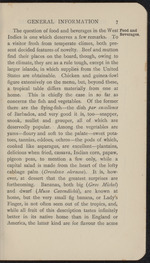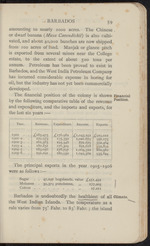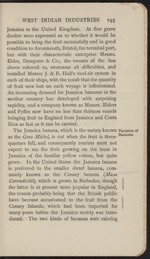| 1 |
 |
“...of which are
deservedly popular. Among the vegetables are
yams—floury and soft to the palate—sweet pota-
toes, tannias, eddoes, ochros—the pods of which,
cooked like asparagus, are excellent—plantains,
delicious when fried, cassava, Indian corn, papaw,
pigeon peas, to mention a few only, while a
capital salad is made from the heart of the lofty
cabbage palm (Oreodoxa oleracea). It is, how-
ever, at dessert that the greatest surprises are
forthcoming. Bananas, both big (Gros Michel)
and dwarf (Musa Cavendishii), are known at
home, but the very small fig banana, or Lady’s
Finger, is not often seen out of the tropics, and,
while all fruit of this description tastes infinitely
better in its native home than in England or
America, the latter kind are for flavour the acme...”
|
|
| 2 |
 |
“...BARBADOS
59
amounting to nearly 2000 acres. The Chinese .
or dwarf banana (Musa Cavendishit) is also culti-
vated, and about 40,000 bunches are now shipped
from 100 acres of land. Manjak or glance pitch
is exported from several mines near the College
estate, to the extent of about 500 tons per
annum. Petroleum has been proved to exist in
Barbados, and the West India Petroleum Company
has incurred considerable expense in boring for
oil, but the industry has not yet been commercially
developed.
The financial position of the colony is shown financial
by the following comparative table of the revenue PoBition'
and expenditure, and the imports and exports, for
the last six years :—
Year. Revenue. Expenditure. Imports. Exports.
1900 . . ,£185,475 ,£176,982 ,£1.045,25. £919,011
1901-2 . . 179.973 .75,35° 1,031,679 950,175
1902-3 . . 161,585 194.346 872,679 592,464
1903-4 • ■ 180,831 176,309 821,618 552,891
1904-5 • • 185,056 .78,797 1,069,312 860,982
1905-6 . . 192,291 180,932 1,042,562 935.844...”
|
|
| 3 |
 |
“...thirteen vessels
bringing fruit to England from Jamaica and Costa
Rica as fast as it can be carried.
The Jamaica banana, which is the variety known Varieties of
as the Gros Michel., is cut when the fruit is three- Bananas-
quarters full, and consequently tourists must not
expect to see the fruit growing on the trees in
Jamaica of the familiar yellow colour, but quite
green. In the United States the Jamaica banana
is preferred to the smaller dwarf banana, com-
monly known as the Canary banana (Musa
Cavendishii), which is grown in Barbados, though
the latter is at present more popular in England, |
the reason probably being that the British public
have become accustomed to the fruit from the j
Canary Islands, which had been imported for I
many years before the Jamaica variety was intro-
duced. The two kinds of bananas were existing...”
|
|
